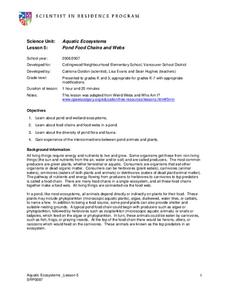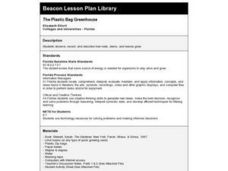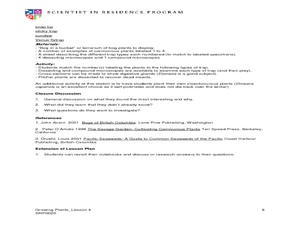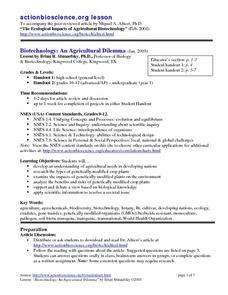Curated OER
Aquatic Ecosystems
Students study ponds and wetland ecosystems and examine the food chains and webs in them. For this aquatic ecosystems lesson students answer questions about the diversity of the flora and fauna in a pond.
Curated OER
Living Organisms
First graders investigate living things that are part of a class aquarium. They make observations and answer guided questions about each organism. Students read a Science textbook and engage in a class discussion about the content. Then...
Curated OER
Science: Putting Down Roots
Fourth graders, in small groups, observe plants and note their characteristics. After drawing pictures of the plants, including their roots systems, they hypothesize in which environments the plants would best thrive. Finally, 4th...
Curated OER
Environment: Valley Walk-A-Thon
Learners go on a nature hike and observe the different plants along their route. Various plants are circled with hula hoops and identified with flash cards. Older students write in their journals about their hiking experience while the...
Curated OER
This Is Tree-rific!
Third graders view a clip of the video Backyard Safari, "Trees," and portray the life cycle of a tree. They also view a clip on structures of a tree and draw a diagram of a tree in their science journals.
Curated OER
Mineral or Maceral Mosaic
Learners study about geologists and their job. They also study that rocks are made up of minerals and organic material by conducting an experiment where they create their own "granite" or "coal".
Curated OER
The Plastic Bag Greenhouse
Third graders observe plants and record their growth. They describe the parts of plants in detail including the roots, stems and leaves.
Curated OER
But I Need This
Third graders place everything in their desk or back pack onto their desk top. They explain why each item is needed. They receive a set of pictures and write a list of things each person or animal needs to survive. They compare people,...
Curated OER
How Do Plants Produce Food?
In this plants worksheet, students write the 3 steps that take place when a plant produces its own food. This worksheet is a graphic organizer.
Curated OER
How Does Your Garden Grow?
Students explore plant life by reading books about gardening. For this botany lesson, students read the books From Seed to Plant and Oh Say Can You Seed? while identifying the necessary elements to raising a healthy plant. Students view...
Curated OER
Diversity/ Organisms Word Search Puzzle
In this literacy worksheet, students practice looking for the words that are related to the idea that is focused upon in the sheet. The skill of spelling is used and vocabulary increases.
Curated OER
Monarch Egg
Students investigate the stages of the Monarch butterfly and its life cycle. In this butterfly life cycle lesson plan, students discuss when, where, and how the Monarch butterflies lay their eggs. After discussion, students...
Curated OER
Get the Dirt
Students investigate a variety of soil samples placed in cold water jars. Layers of soil are examined for the difference between organic matter and rock fragments.
Curated OER
The City From the Ooze
Students investigate the life in the mud found around ponds. They create Ooze City using pond mud. Students investigate the various layers that form and what type of organisms are in the mud.
Curated OER
How Can Plants Be Sorted?
In this plant classification worksheet, students will observe a variety of different plants and categorize each plant by its flowers, leaves, and spines. This worksheet had 13 fill in the blank questions.
Curated OER
Math and Science in a Wetland
Students use scientific methods during field and lab investigations. Students collect specimens and make measurements using the metric system. Students describe biotic and abiotic factors in an estuary and design a model.
Curated OER
Super Scientists Code
In this science activity, students use the key code on the right to unscramble each of the scientists. They also match each of the scientists found to their correct description.
Curated OER
Microscopy Exercises
Students explore organisms and botany by utilizing microscopes. In this microscopic research lesson, students define many plant and organism related vocabulary terms such as conifers, moss and spores. Students view spores and other...
Curated OER
Biotechnology: An Agricultural Dilemma
High schoolers investigate the types of genetically modified crop plants there are and the benefits and risks of such plants. The agricultural needs in developing nations for this biological knowledge to resolve societal issues is also...
Curated OER
Classifying Life
In this classifying life worksheet, high schoolers review the 5 kingdoms of organisms by completing 10 matching and 7 fill in the blank questions.
Curated OER
Keys and Classifying
Students classify plants and animals. In this organisms lesson, students define classification and sort various objects according to its attributes. Students then research wildlife of Utah and group the organisms into categories.
Curated OER
Ecosystems - Lessons 1 and 3
In this biology worksheet, students answer 22 multiple choice questions on ecosystem. They identify which ecosystem component is described in each of the question.
Curated OER
Learning From Leaves: Adaptations To Differing Light Levels
Pupils, in groups, examine plants with different light levels. They are given plants from a tropical and desert region. They write a hypothesis at the beginning of the experiment.
Curated OER
Understanding Science Vocabulary And Categorization
Young scholars explore and examine scientific language and categorization as related to commonly known plants and animals. They hypothesize about a specific plant or animal, how it was scientifically named, what concepts and vocabulary...























